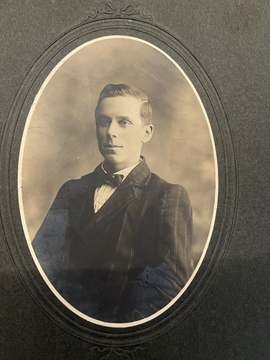DURANT, Ernest
| Service Number: | 1665 |
|---|---|
| Enlisted: | Not yet discovered |
| Last Rank: | Private |
| Last Unit: | 24th Infantry Battalion |
| Born: | Not yet discovered |
| Home Town: | Not yet discovered |
| Schooling: | Not yet discovered |
| Occupation: | Not yet discovered |
| Memorials: |
World War 1 Service
| 16 Jul 1915: | Involvement Private, 1665, 24th Infantry Battalion, --- :embarkation_roll: roll_number: '14' embarkation_place: Melbourne embarkation_ship: HMAT Demosthenes embarkation_ship_number: A64 public_note: '' | |
|---|---|---|
| 16 Jul 1915: | Embarked Private, 1665, 24th Infantry Battalion, HMAT Demosthenes, Melbourne |
WW1 service history
The following information was gathered from Ernest prior to his death by his Granddaughter Jennifer and transcribed from hand written notes by his Great Grandson Stephen.
When WW1 started Ernest with some of his mates, after a few drinks, enlisted in the army. He was 20 when he enlisted with his date of attestation on 10-May-1915 and embarked for Heliopolis and Gallipoli on 16-July-1915.
On 4-September-1915 the 24th Battalion went ashore at Gallipoli and spent 16 weeks in the Lone Pine trenches sharing duty with the 23rd Battalion.
His comments about the war were brief and very rare. His only comments on Gallipoli were that when they landed the men who were there cried because they thought they had been forgotten. The men were filthy, they had been unable to wash or bury the dead. He mentioned a truce a being called to bury the dead and how they mixed with the Turks in this duty in a friendly manner and soon after they were fighting again.
After Gallipoli he travelled to France. One time they were given new uniforms and were travelling by train and the day was so beautiful they climbed on to the roof of the train. Soon the peasants in the fields started making frantic hand signals which they belatedly misunderstood. Up ahead was railway tunnel and all they could do was duck and pray. They survived, but when they climbed down at their destination their nice new uniforms were filthy, much to the anger of the officers.
Whilst fighting in France he mentioned an incident in which some Germans were sending up Very lights at regular intervals and no-one could get any sleep. So Ernie, with some others crawled out to stop them, armed with a knife. They surrounded the depression the Germans were in and waited for the next light to go up and jumped in the depression. They killed them and then crawled back to the trenches to get some sleep.
Then it was the mud of Flanders Fields. Living in a sea of mud, never dry or clean. One day whilst walking to an aid station his foot slipped off the boards lining the trench and sunk up to his calf in mud. He pulled and pulled to get his foot out and finally it came out minus the boot. Try as he might he could not get his boot out so he arrived at the aid station with one boot on and one bare foot. The Padre, after inquiring and being told what had happed said "Well, there is a young chap over there about your size and he has no need for boots any more". So it was a case of dead men's shoes.
Once they were given leave and arrived in England straight from the front. As they walked down the street staring in wonderment at their surroundings, so different from months of living in the trenches, the people were staring at them. They were dirty, unshaved, lousy and clutching their guns. So their first stop was the place where they could bathe and trade in their old uniforms. Then it was out on to the streets for some hell-raising.
Then came the day when they saw clouds of gas rolling towards them. They did not have gas masks and most did not have even have handkerchiefs to use as masks because like Ernest, they had used them to clean their guns. After being gassed Ernest was evacuated to England. Because of the gas his eyes were bandaged and he was led on to the ship by a POW. All he could think was "I hope the bloody blighter does not walk me off the end of the pier". All the German POW could say in his broken English was that the war was over for him and that he would now live and be safe in England in a POW camp.
The hospital he was sent to was a few miles from his home town where his parents were still living. His parents were not allowed to visit him for a few weeks, the reason being that the men looked so terrible with the mustard gas burns that the powers that be were afraid a panic would be caused if the civilians saw the men.
Throughout the rest of the war he spent time in Group Hospital in Wiltshire before boarding a ship for home on 23-May-1919 and was discharged from the AIF on 23-Jul-1919.
On 27-April-1920 he married Margaret, with whom he'd corresponded with during the war and had 4 children.
Ernie lived a long life and died on 15-May-1978 aged 82, 14 days after his beloved Margaret passed away. By then he was blind in one eye, almost blind in the other and had emphysema, probably caused by the mustard gas.
The funeral cortege went past the Footscray RSL where the flag was lowered and the last post played. The coffin was covered with the Australian flag and topped by a single wreath of flowers in the shape of a diamond, one half red and the other half white, the motive of the 24th Battalion.
Submitted 25 February 2024 by stephen hill










